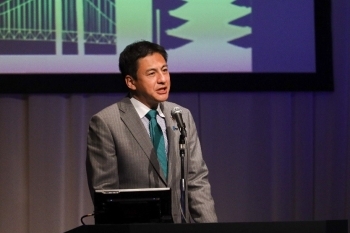Disarmament and Non-Proliferation, Peaceful Uses of Nuclear Technology
The 29th Asian Export Control Seminar

The 29th Asian Export Control Seminar was held from February 14 to 15, 2023. The Seminar was organized by the Center for Information on Security Trade Control (CISTEC) and co-hosted by the Ministry of Foreign Affairs and the Ministry of Economy, Trade and Industry. It brought together approximately 150 participants from 30 countries and regions, as well as 8 international and other organizations.
1. Background
Asian countries and regions face a growing risk of illegal procurement activities by countries and regions of concern. With their economic growth, they have become global manufacturing and trade hubs for items and technologies that can be diverted to develop weapons of mass destruction. This seminar was held to promote regional and international non-proliferation efforts by raising awareness and building confidence among competent authorities in Asian countries and regions for export controls to enhance their capacity.
2. Outline
(1) Opening Remarks
At the outset of the Seminar, State Minister for Foreign Affairs of Japan TAKEI Shunsuke emphasized the responsibility of Japan as G7 chair for international peace and stability, including non-proliferation, and highlighted the importance of implementing export controls by each country/region in accordance with the International Export Control Regimes rules to ensure international security. He hoped that the Seminar would cater to sharing awareness of the challenges and deepening the know-how on export controls where the non-proliferation community as a whole could advance efforts toward realization of a peaceful and stable world, while referring to export controls as important tools to implement the United Nations Security Council Resolutions. (Opening Remarks by Mr. TAKEI Shunsuke, State Minister for Foreign Affairs, at the 29th Asian Export Control Seminar (PDF) )
)
(2) Strengthening Export Controls in Asia
Government officials from Bangladesh, Cambodia, China, India, South Korea, Laos, Malaysia, Pakistan, the Philippines, Singapore, Thailand and Hong Kong reported updates on their export control systems.
(3) Efforts by Each Country/Region in Response to Recent Developments
Government officials from Japan, the United States, the European Union, Germany and the Philippines, at a panel discussion on outreach to industry and academia in consideration of increasing importance of advanced technology, shared their awareness of challenges and explained their current efforts on export controls.
(4) Activities under International Frameworks
Experts from the United Nations Security Council Committee established pursuant to Resolution 1718, the 1540 Committee Group of Experts, the United Nations Department of Political and Peacebuilding Affairs and the Organisation for the Prohibition of Chemical Weapons (OPCW) explained their activities. Representatives from the International Export Control Regimes (the Nuclear Suppliers Group, the Australia Group, the Missile Technology Control Regime, and the Wassenaar Arrangement) also reported their recent activities.
3. Participating Countries, Regions and International Organizations
(1) Asia (16 countries/ regions)
Japan, Bangladesh, Cambodia, China, India, Indonesia, South Korea, Laos, Malaysia, Pakistan, the Philippines, Singapore, Thailand, Vietnam, Hong Kong and Taiwan
(2) Outside Asia (14 countries/ regions)
Australia, Canada, Ecuador, the European Union, Germany, Hungary, Latvia, Mexico, the Netherlands, Slovakia, Switzerland, the United Arab Emirates, the United Kingdom and the United States
(3) International and Other Organizations (8 Organizations)
The United Nations Security Council Committee established pursuant to Resolution 1718, the 1540 Committee Group of Experts, the United Nations Department of Political and Peacebuilding Affairs, the OPCW and the International Export Control Regimes (the Nuclear Suppliers Group, the Australia Group, the Missile Technology Control Regime, and the Wassenaar Arrangement)

